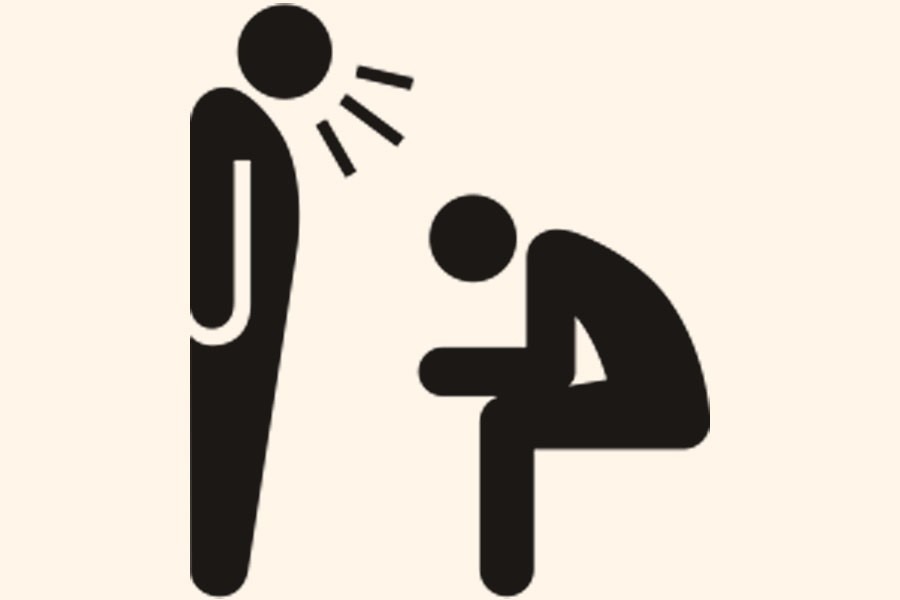
Published :
Updated :

A few months back, the result of a decade-long survey in India revealed that 55 per cent of Indians regularly use harsh, abusive or cuss words, with Delhi emerging as the most abusive state at 80 per cent. The nationwide 'Gali Index' (or index of scolding) showed that over half the country uses abusive language casually. The survey, conducted between 2014 and 2025 by the 'Gaali Band Ghar' campaign, found that verbal abuse, particularly against women, is a normal thing in most of the households of the country.
The survey's findings are not just interesting, but also deeply disturbing. They reveal a pervasive verbal aggression that challenges the perceived progress of Indian society. The fact that both men and women freely use abusive language is not a casual habit, but a pressing social problem that demands immediate attention from all quarters.
Though no similar survey has been conducted in Bangladesh by any national organisation, it is highly likely that the situation here is not anyway better than in India. From house to street, the use of abusive words by a sizeable number of people is a common thing in the country now. Most of them use slang, curse words, disrespectful terms and hateful jargon along with rude attitudes and abhorrent behaviours, often casually. Apparently, they find nothing wrong in it. In other words, the use of abusive language or swearing becomes a normal thing for many and it becomes difficult to counter them by logic.
The question that arises is what fuels this surge of abusive language, which is vitiating our society. The use of abusive terms or hateful words in everyday conversations is often a reflection of various underlying intentions. People resort to such language to vent their frustrations, air their grievances, express their disappointments, and assert dominance. In some cases, abusive words are exchanged in a friendly manner or among friends and comrades. However, the societal impact of this verbal aggression cannot be overlooked.
Daily stress, bad traffic, and a fast-paced life in Dhaka often lead to disappointment and anger, prompting many to resort to using curse words. The class difference is also critical in this connection, and the use of rough language is widespread among the so-called lower-class individuals, such as rickshaw and van pullers, bus drivers, beggars, and street vendors. In many cases, they go for cuss words targeting those who are better off. For instance, rickshaw and van pullers regularly use abusive language against private car drivers and passengers as a means to express their anger for being deprived of such comfort and luxury.
There is, however, no doubt that the terrible traffic in Dhaka is good enough to fuel anger and frustration among the millions of daily commuters. Being helpless, they apply abusive words to vent their disappointment and, in many cases, against those who are comparatively weak. In some cases, the use of bad words leads to physical abuse and violent acts. The entire issue is linked to a culture of bad governance and mismanagement in the country.
Again, several educated and cultured people are not immune to using profanity or rebuking others with harsh words, especially when they face obstacles. Instead of being patient or trying to resolve the issue amicably, they become rude, thus making the situation worse.
Some psychologists argue that using abusive language is not always bad, as 'swearing is an emotion-based coping mechanism that makes people feel more resilient.' They also add that swearing helps alleviate pain and makes one stronger; that 'abusive profanity replaces physical violence.' The positive aspects of using abusive language, however, do not justify its encouragement.
Overall, the use of abusive language is a complex interplay of social dynamics, as identified by researchers. This underscores the urgent need for counselling to help individuals manage their emotions effectively. As chronic use of abusive language scars both the abusers and the abused psychologically, it is necessary to address the underlying emotional triggers.
Finally, the use of abusive language is linked to broader socio-economic conditions. This highlights the crucial role of social reforms in addressing the issue. Without addressing the conditions or fixing the prolonged flaws, it will be difficult to contain the spread of vulgar language.
asjadulk@gmail.com


 For all latest news, follow The Financial Express Google News channel.
For all latest news, follow The Financial Express Google News channel.